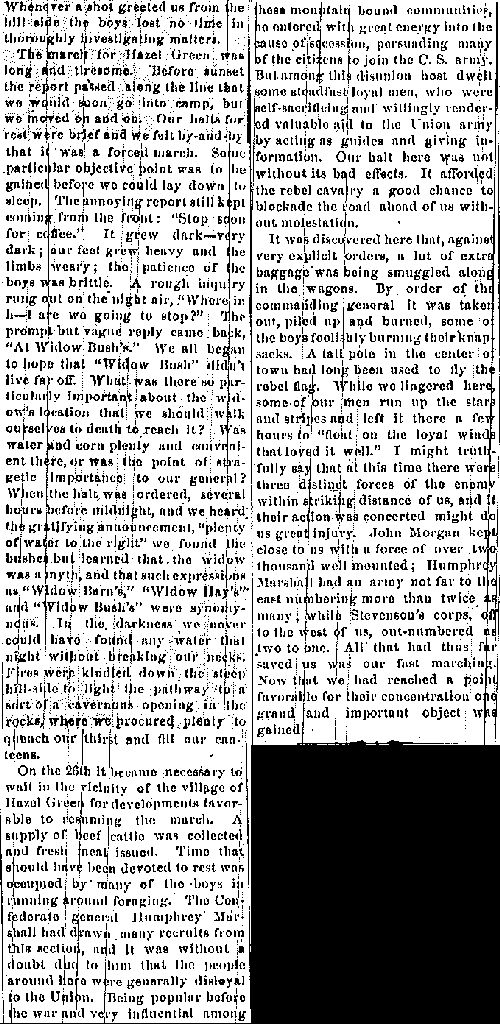| Camp & Field Page 38D | Camp & Field Index Page | 16th OVI Home Page | Camp & Field Page 38F |
The Camp & FieldArticles by Theodore Wolbach |
 Cpl. Theodore D. Wolbach |
The following image is taken from a book titled "Mortality and Statistics of the Census of 1850" in which it is believed retired Captain Rezin H. Vorhes, Company H, pasted over the pages a series of articles written by Cpl. Theodore D. Wolbach, Company E, titled "Camp and Field" and published, by chapter, in the Holmes County (Ohio) Republican newspaper from February 24, 1881 to August 17, 1882. The articles tell the story, in great detail and color, of the 16th OVI, from the inception of the 3-year regiment in October, 1861, through all its camps, battles and marches until it was disbanded on October 31, 1864. The articles pasted in the Vorhes book cover the first 35 chapters, published through October 20, 1881. All the remaining chapters were recently found in a Holmes County library by researcher Rob Garber who obtained copies, performed the transcriptions and provided to this website and which are also presented here, thus providing the complete work by Theodore Wolbach.
Throughout these articles click on the underlined white text for additional details.
The webauthor thanks 16th Ohio descendant Rob Garber for his excellent research on the Camp And Field articles and for performing the tedious digital transcription of those articles found on each page. The transcriptions were made to reflect the original articles verbatim, misspellings and all. Rob is the 3rd great nephew of Capt. William Buchanan, Company F, 16th Ohio, who served in the 90-day regiment as a private, re-enlisting in the three year regiment, and eventually making the rank of Captain of Company F. Thanks Rob!
Page 38E - Chapter 23 - September, 1862
 |
Whenever a shot greeted us from the hillside the boys lost no time thoroughly investigating matters. The march for Hazel Green was long and tiresome. Before sunset the report passed along the line that we would soon go into camp, but we moved on and on. Our halts for rest were brief and we felt by-an-by that it was a forced march. Some particular objective point was to be gained before we could lay down to sleep. The annoying report still kept coming from the front: On the 26th it became necessary to wait in the vicinity of the village of Hazel Green for development favorable to resuming the march. A supply of beef cattle was collected and fresh meat issued. Time that should have been devoted to rest was occupied by many of the boys in running around foraging. The Confederate general Humphrey Marshall had drawn many recruits from this section, and it was without a doubt due to him that the people around here were generally disloyal to the Union. Being popular before the war and very influential among |
these mountain bound communities, he entered with great energy into the cause of secession, persuading many of the citizens to join the C. S. army. But among this disunion host dwell some steadfast loyal men, who were self-sacrificing and willingly rendered valuable aid to the Union army by acting as guides and giving information. Our halt here was not without its bad effects. It afforded the rebel cavalry a good chance to blockade the road ahead of us without molestation. It was discovered here that, against very explicit orders, a lot of extra baggage was being smuggled along in the wagons. By order of the commanding general it was taken out, piled up and burned, some of the boys foolishly burning their knapsacks. A tall pole in the center of town had long been used to fly the rebel flag. While we lingered here, some of our men run up the stars and stripes and left it there a few hours to |
| Camp & Field Page 38D | Camp & Field Index Page | 16th OVI Home Page | Camp & Field Page 38F |